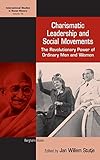Charismatic Leadership and Social Movements : The Revolutionary Power of Ordinary Men and Women / ed. by Jan Willem Stutje.
Material type: TextSeries: International Studies in Social History ; 19Publisher: New York ; Oxford : Berghahn Books, [2012]Copyright date: ©2012Description: 1 online resource (212 p.)Content type:
TextSeries: International Studies in Social History ; 19Publisher: New York ; Oxford : Berghahn Books, [2012]Copyright date: ©2012Description: 1 online resource (212 p.)Content type: - 9780857453297
- 9780857453303
- 303.34 320.01/9
- JC330.3 .C435 2012
- JC330.3 .C43 2012
- online - DeGruyter
| Item type | Current library | Call number | URL | Status | Notes | Barcode | |
|---|---|---|---|---|---|---|---|
 eBook
eBook
|
Biblioteca "Angelicum" Pont. Univ. S.Tommaso d'Aquino Nuvola online | online - DeGruyter (Browse shelf(Opens below)) | Online access | Not for loan (Accesso limitato) | Accesso per gli utenti autorizzati / Access for authorized users | (dgr)9780857453303 |
Frontmatter -- Contents -- List of Abbreviations -- Acknowledgements -- Introduction: Historiographical and Theoretical Aspects of Weber’s Concept of Charismatic Leadership -- I. The Charismatic Family -- 1 A New Kind of Force: Examining Charisma in the Light of Gandhi’s Moral Authority -- 2 An Unlikely Charismatic Leader: D.F. Malan in a Weberian Light -- 3 Bearded, Attractive and Beloved: The Charisma of Ferdinand Domela Nieuwenhuis (1846–1919) -- 4 Errico Malatesta and Charismatic Leadership -- 5 Pasionaria: A Case of Charisma through Representation -- 6 Mao Zedong: Charismatic Leadership and the Contradictions of Socialist Revolution -- II. Charismatic Observations -- 7 Charismatic Leaders, Political Religion and Social Movements: Western Europe at the End of the Nineteenth Century -- 8 ‘Je ne sais quoi’: Some Reflections on the Study of Charisma -- 9 Incendiary Personalities: Uncommon Comments on Charisma in Social Movements -- Bibliography -- Notes on Contributors -- Index
restricted access online access with authorization star
http://purl.org/coar/access_right/c_16ec
Much of the writing on charisma focuses on specific traits associated with exceptional leaders, a practice that has broadened the concept of charisma to such an extent that it loses its distinctiveness – and therefore its utility. More particularly, the concept’s relevance to the study of social movements has not moved beyond generalizations. The contributors to this volume renew the debate on charismatic leadership from a historical perspective and seek to illuminate the concept’s relevance to the study of social movements. The case studies here include such leaders as Mahatma Gandhi; the architect of apartheid, Daniel F. Malan; the heroine of the Spanish Civil War, Dolores Ibarruri (la pasionaria); and Mao Zedong. These charismatic leaders were not just professional politicians or administrators, but sustained a strong symbiotic relationship with their followers, one that stimulated devotion to the leader and created a real group identity.
Mode of access: Internet via World Wide Web.
In English.
Description based on online resource; title from PDF title page (publisher's Web site, viewed 25. Jun 2024)


